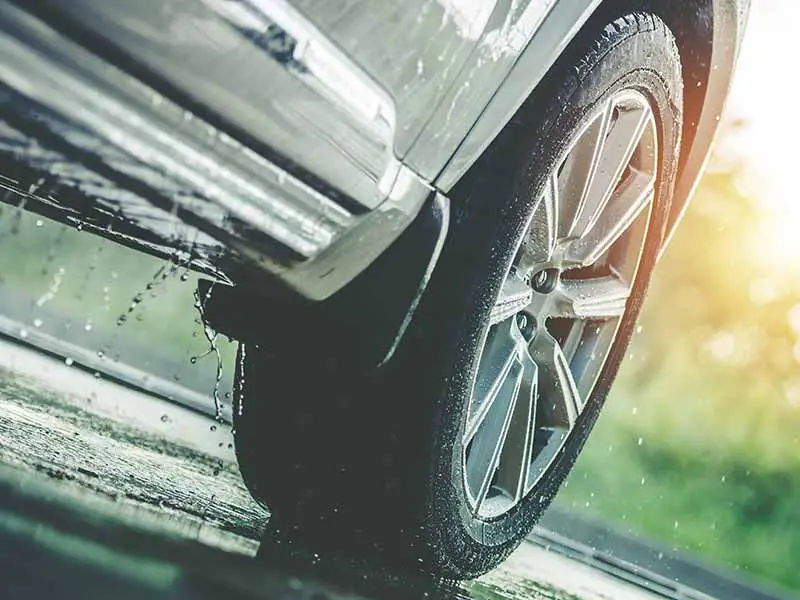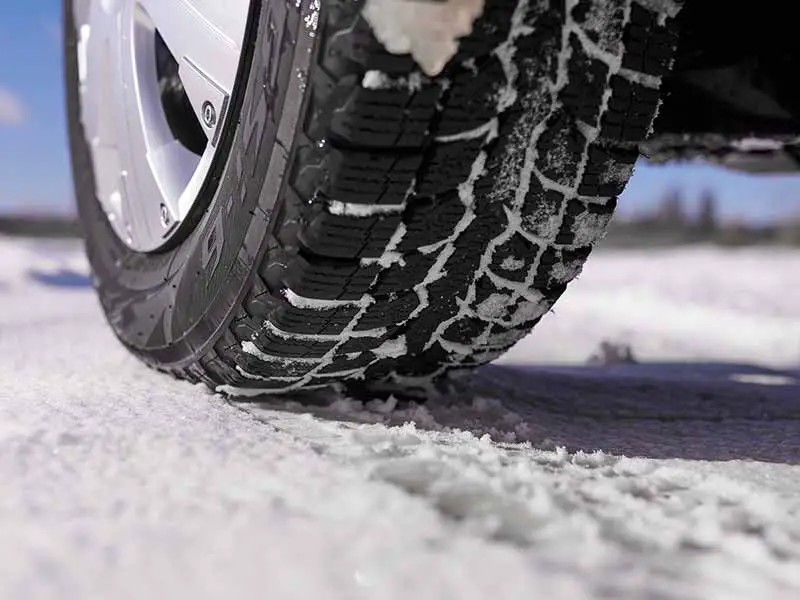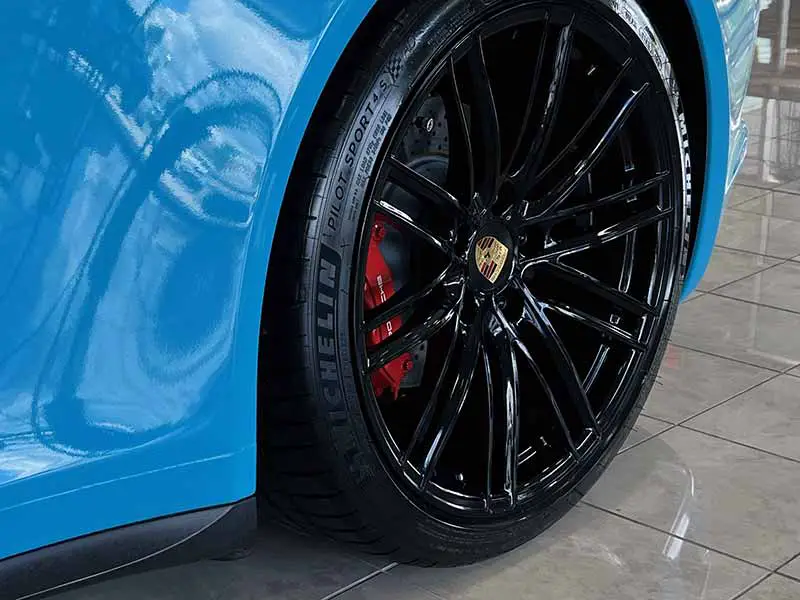Summer tires are a great category of tires that are designed to perform better in warm weather and wet roads, but their performance quickly begins to fade in cold weather conditions.
No tire can be expected to be exceptional under all circumstances. This is why there exist specific types of tires for common driving situations.
What Are Summer Tires?
Summer tires are optimized for use in warm weather. They are not well suited for colder temperatures below 45º F. They provide excellent traction on both dry or wet roads. They use softer rubber compounds than all-season tires to enhance grip. Summer tires are usually considered performance tires.
Summer tires make sense for drivers in warm climates or those that will need dedicated winter tires in the winter months. But are they the best choice for you?
Let’s take a closer look.

Michelin Pilot Sport 4 S Summer
What Are The Benefits Of Summer Tires?
Summer tires, as the name implies, are designed to be used during warmer weather. They lose grip in cold weather and should not be used in freezing temperatures.
Summer tires generally are considered performance tires due to the softer rubber compound and more aggressive tread patterns that enhance grip in wet and dry conditions.
Their increased performance improves braking capabilities as well as better traction when accelerating and excellent cornering performance.
Summer Tires Temperature Range
As cold temperatures set in, the tread blocks become less flexible and summer performance tires begin to lose all of their advantages. They can provide adequate traction at 45º F, but when the temperature drops below this point regularly you should remove your summer tires and replace them with an all-season, all-weather, or winter tires.
Attempting to use a summer tire in winter weather is very dangerous and damaging to the tire tread compounds. The rubber becomes brittle and can easily crack and break away, quickly ruining the tire and creating an unsafe situation. When the rubber loses its elasticity it can no longer properly grip the pavement.
All-season tires are a much more appropriate choice for those that want a performance-oriented radial tire that can also handle light snow and mild winter driving conditions.

Summer Tires In Rain
Summer tires perform extremely well in wet conditions and are ideal for dealing with heavy rain driving conditions. Summer tires outperform all-season tires at shedding water out from under the contact patch as well.
There is no better choice for dealing with heavy rain than a good summer tire. Wet traction is a critical aspect for all tires, but summer tires are uniquely designed with wider grooves and tread blocks that best allow water to flow away from beneath the tire.
Summer Tires In Snow
Cold temperatures begin dramatically reducing the ability of summer tires. Light snow typically doesn’t accumulate until temperatures are at or below freezing regularly. This means that your summer tires have lost a significant amount of their performance ability for even dry surfaces, let alone snow.
Summer tires typically have shallower and wider tread blocks and grooves which are great for allowing water to quickly escape, but less ideal for providing traction in snowy conditions.
Winter tires have many more biting edges that allow it to grip better in difficult snow and slush conditions.
Do Summer Tires Wear Faster Than All-Season?
Summer tires typically use softer rubber compounds in their formulations. This soft rubber improves traction but at the cost of longer tread life.
All-season tires will not maintain traction as well as summer tires, but they will last longer than summer tires.
Do Summer Tires Wear Faster In Winter?
Winter conditions are particularly brutal on summer tires. The soft rubber designed to withstand hot pavement used in summer tires becomes brittle and cracks in winter conditions. This causes them to quickly wear down.
Summer tires shouldn’t be used year round unless you live in a milder climate that only experiences freezing temperatures rarely, if ever.

Summer Vs Performance Tires
Tire nomenclature is a confusing thing. Summer tires are performance tires, generally speaking. But performance tires are not necessarily summer tires.
There are all-season tires that are performance as well. They usually aren’t high performance or extreme performance, but performance oriented with the ability to be used year round and deal with occasional cold weather and light snow.
Summer tires aren’t just for sports cars though. Summer tires do provide better performance in dry and wet conditions as well as excellent handling and braking performance. This isn’t just for the sake of performance though. A better performing tire is a safer tire.
Summer Vs All-Season Tires
All-season tires are designed to be used in all seasons, as the name implies. Summer tires are d
All-season tires will usually last longer due to the need to use a firmer rubber compound that can better handle mild cold temperatures.
All-season tires are good at dealing with heavy rain, but summer tires are much better able to evacuate water away from the tread.
Summer Vs Performance All-Season Tires
Summer tires will usually provide better handling and braking performance than comparable all-season tires. Although, all-season tires can be very capable alternatives that offer sports car owners a single tire that can provide year round performance.
Summer Vs Winter Tires
Winter tires are designed to deal with extreme winter conditions such as extreme cold, snow, ice, and slush. They have rubber compounds that stay flexible in extreme cold temperatures and lots of sipes that create biting edges to improve traction in snow and slush.
A summer tire is designed to deal with hot pavement and heavy rain. They are also often found on high performance vehicles that are ill-suited for winter driving. The large tread blocks and wide grooves provide more rubber to grip the road and wide channels that water can flow through and away from the contact patch.
Most drivers that deal with winter weather long enough to need winter tires will likely also have all wheel drive to help improve traction. Vehicles that may be well suited for using winter tires and summer tires are performance-oriented all wheel drive cars and trucks.
Front wheel drive or rear wheel drive vehicles will likely use only one or the other combined with all-season tires when conditions are no longer right for summer or winter tires.
How To Identify Summer Tires
Unfortunately, there isn’t a symbol for summer tires like there is for mud and snow (M+S) tires or winter tires (mountain and snowflake icon). They may also not even have the designation “Summer” molded into the sidewall.
A summer tire will have wide tread blocks and shallow, wide grooves. All-season tires will have more tread blocks and deeper tread grooves. It can be difficult to tell the difference visually if you’re not familiar.
The best way to be sure that you have summer tires is to look up the tire make and model molded into the sidewall and refer to the tire manufacturer’s description.
Storing Summer Tires In Winter
Summer tires have special requirements to ensure they are in good shape when it’s time to put them back on your car or truck.
The rubber used is prone to cracking in cold temperatures so they are best stored at normal room temperature. They shouldn’t be exposed to temperatures below 20º F and should be allows to slowly return to warmer temperatures if they happen to accidentally get frozen.
Storing them in an unheated garage or storage building will damage the rubber and can and ruin them if the outside temperatures regularly drop below freezing or further.
Can I Use Summer Tires All Year? (In Winter)
Summer tires are safe to use at temperatures above 45º F. If your climate rarely or ideally never experiences temperatures below this point, you should be able to safely use a summer tire all year long.
If you experience temperatures below 45º F more than once or twice a year or these rare dips are below 40º F, you should consider all-season tires instead. There are many great performance all-season tires on the market that will allow you to use them all year long and perform extremely well.
Alternatively, you can swap your tires when temperatures begin to dip below 45º F to all-season tires, all-weather tires, or winter tires when the climate is no longer suitable for a summer tire.
Are Summer Tires Worth It?
Summer tires are worth it for those that want to maximize performance or deal with heavy rain conditions frequently. If this doesn’t sound like your situation, you’re probably better off with all-season tires.
Resources
Below are some links you may find helpful when learning about tires
- What are summer tires and do I need them? – TireBuyer.com
- Why you shouldn’t use summer tires during winter – Continental Tires
Final Thoughts
Summer tires aren’t right for everyone obviously. But they’re great for those that prize performance over cost. They excel at wet and dry traction but at the expense of overall tire life and the inability to deal with cold weather.
This doesn’t mean that summer tires are only for sports car enthusiasts though. They provide superior traction in heavy rain which is extremely important for those in wetter environments.
Also, better performance means better safety. Improved stopping distances during emergency braking and better road holding during unexpected avoidance maneuvers.
Whether you’re a sports car enthusiast or a safety-conscious driver, a summer tire is a great performer and a good choice if you have the desire for maximum traction.





